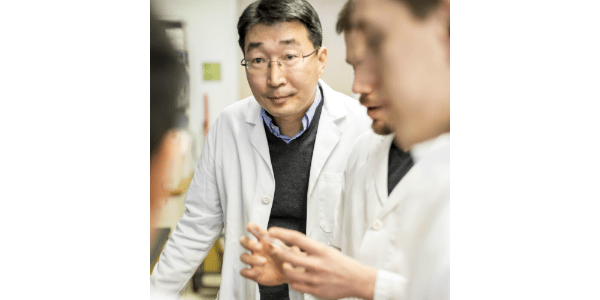UW Bioengineering Associate Professor Deok-Ho Kim and a team of international collaborators were awarded a Human Frontiers Science Program (HFSP) Research Grant to investigate the dynamics of collective cell migration on curved surfaces. Their work aims to shed light on the mechanistic details underlying organism development and tissue repair, which could inform new and more effective approaches in tissue engineering and regenerative medicine.
The HFSP Research Grants provide funding support to innovative, frontier research projects in life sciences that employ cutting-edge scientific and technological methodologies to study highly complex mechanisms in living organisms. The award specifically recognizes and encourages interdisciplinary research involving scientists from various countries to facilitate collaborations across borders and continents.
Dr. Kim and his collaborators are among 23 awardees of the grant from around the world, selected from 63 full applications and 770 initial letters of intent. The grant provides $400,000 annually for a three-year period.
Dr. Kim will serve as the award’s co-principal investigator with Dr. Chwee Teck Lim, the NUS Society Chair Professor at the Department of Biomedical Engineering and a Principal Investigator at the Mechanobiology Institute at the National University of Singapore. Other co-principal investigators on this project include Dr. Delphine Delacour from the Department of Cell Adhesion and Mechanics at the Institut Jacques Monod-CNRS, France, and Professor Jacques Prost, Emeritus Research Director of the Institut Curie, France.
Dr. Kim and his team will develop a novel, multi-dimensional approach for studying the impact of surface curvature on tissue-level processes such as collective cell migration. The researchers will fabricate microstructures with defined topographies and extracellular matrix patterns and identify the role of biomolecular components in mediating collective cell migration on curved geometries. They also plan to develop computational tools to quantitate mechanical parameters that influence tissue dynamics and theoretical models that could guide future research in this field.
About Dr. Kim’s research
The Kim lab’s research spans the disciplinary boundaries between biomaterials, nanotechnology and cell mechanobiology, with an emphasis on their applications to tissue engineering and regenerative medicine.
Through the use of multi-scale fabrication and integration tools in combination with human pluripotent stem cell technologies, the Kim lab focuses on the development of biomimetic microenvironments and functional tissue engineering models for developmental biology, disease modeling, drug screening and cell-based therapies. Specific projects include human iPSC-based microphysiological models of neuromuscular and cardiac muscle disease, mechanobiology approaches to studying human diseases, micro/nano-fabricated assay platforms for drug efficacy/toxicity screening and functional biomaterials for regenerative engineering.
The Kim lab ultimately aims to better understand complex cellular behavior in response to microenvironmental cues in normal, aging and disease states, to gain new mechanistic insights into the control of cell-tissue structure and function and to develop multi-scale regenerative technologies for improving human health.
Learn more about the Kim lab
About the Human Frontier Science Program
The Human Frontier Science Program (HFSP) funds research at all levels of biological complexity from biomolecules to the interactions between organisms. Key elements of HFSP’s mission are:
- Support for innovative, cutting edge research at the frontiers of the life sciences;
- Encouragement of high risk research;
- Promotion of international collaboration in the spirit of science without borders;
- Support for financial and intellectual independence for early career researchers.



